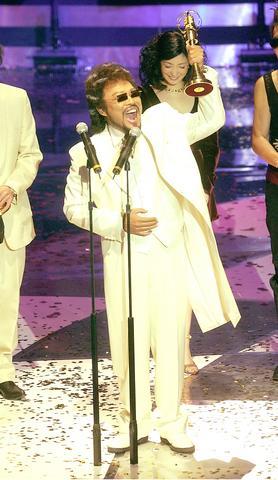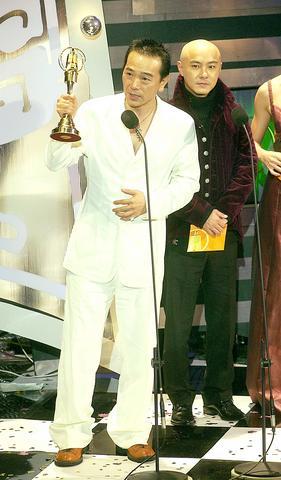Public Television Service (
PTS won in 11 award categories. The best lead actor honor went to Chang Chen-kuang (

PHOTO: TAIPEI TIMES
The awards ceremony took place last night at Sun Yat-sen Memorial Hall in Taipei, and opened with a star-studded red-carpet walk that drew hundreds of fans.

PHOTO: TAIPEI TIMES
Croatian pianist Maksim, Korean actors Ahn Jae-wook and Ha Ji-won, both of whom have large fan bases in Taiwan for their TV dramas, pop diva Stefanie Sun (
The four-hour gala event was hosted by Kevin Tsai (
PTS demonstrated its power for producing quality programs at the Golden Bell Awards -- Taiwan's answer to the Emmy Awards -- especially in drama and cultural programming.
The TV company took home four awards for its programs, including the best TV drama Banquet (
PTS won 18 award categories at Golden Bell Awards last year, well ahead of all the other TV stations in Taiwan.
In the variety show categories, Taiwan's veteran TV host Chang Fei (張菲) won the award for the best TV host for variety shows for his popular show Variety Big Brother (綜藝大哥大). The award for best variety program, however, went to Variety Sum-up (綜藝大集合).
Having hosted TV shows for 30 years, Chang expressed his gratitude to all his guests who have been entertained and "tortured" in his shows. He also gave thanks to his alleged girlfriend from Belarus, Margarita, who serves as the assistant hostess and comedienne in his show.

Last week saw the appearance of another odious screed full of lies from the People’s Republic of China (PRC) Ambassador to Australia, Xiao Qian (肖千), in the Financial Review, a major Australian paper. Xiao’s piece was presented without challenge or caveat. His “Seven truths on why Taiwan always will be China’s” presented a “greatest hits” of the litany of PRC falsehoods. This includes: Taiwan’s indigenous peoples were descended from the people of China 30,000 years ago; a “Chinese” imperial government administrated Taiwan in the 14th century; Koxinga, also known as Cheng Cheng-kung (鄭成功), “recovered” Taiwan for China; the Qing owned

In Taiwan’s politics the party chair is an extremely influential position. Typically this person is the presumed presidential candidate or serving president. In the last presidential election, two of the three candidates were also leaders of their party. Only one party chair race had been planned for this year, but with the Jan. 1 resignation by the currently indicted Ko Wen-je (柯文哲) of the Taiwan People’s Party (TPP) two parties are now in play. If a challenger to acting Chairman Huang Kuo-chang (黃國昌) appears we will examine that race in more depth. Currently their election is set for Feb. 15. EXTREMELY

Jan. 20 to Jan. 26 Taipei was in a jubilant, patriotic mood on the morning of Jan. 25, 1954. Flags hung outside shops and residences, people chanted anti-communist slogans and rousing music blared from loudspeakers. The occasion was the arrival of about 14,000 Chinese prisoners from the Korean War, who had elected to head to Taiwan instead of being repatriated to China. The majority landed in Keelung over three days and were paraded through the capital to great fanfare. Air Force planes dropped colorful flyers, one of which read, “You’re back, you’re finally back. You finally overcame the evil communist bandits and

They increasingly own everything from access to space to how we get news on Earth and now outgoing President Joe Biden warns America’s new breed of Donald Trump-allied oligarchs could gobble up US democracy itself. Biden used his farewell speech to the nation to deliver a shockingly dark message: that a nation which has always revered its entrepreneurs may now be at their mercy. “An oligarchy is taking shape in America of extreme wealth, power and influence that literally threatens our entire democracy, our basic rights and freedoms,” Biden said. He named no names, but his targets were clear: men like Elon Musk